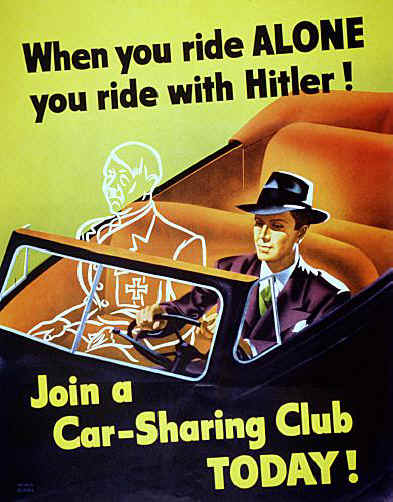
"That damned Hitler, doesn't pay his share for the gas, plays around with the radio, always wants to take the long way through the Sudetenland..."
My 93-year-old father, along with all of the other veterans at his assisted living facility, were honored yesterday for their service to the country. He is, I suppose, a member of what Tom Brokaw called the “greatest generation.” He volunteered for military duty the day after Pearl Harbor, but was rejected for bad eyesight. About a year later, the army, having become far less picky in the interim, drafted my dad and put him in a clerical position with a unit that would later be attached to 1st Army headquarters. He helped liberate Europe mostly by tabulating AWOL reports on primitive card punch machines and playing softball, but he did his duty along with millions of other servicemen and women. My mother and her sisters, meanwhile, did their part by participating in scrap metal drives, saving grease, and buying war bonds. Necessities were rationed, ordinary items became luxuries, and if anyone complained they’d be met with the same sarcastic reply: “don’t you know that there’s a war on?”
Fast forward to the present, where the Bush administration is up to its elbows in the Global War on Terror™. That war, the president has assured us, is the equivalent to the war waged against Nazi Germany and imperialist Japan. If that’s the case, however, we must ask: where’s the sacrifice? During the Second World War, it wasn’t just the troops in the field and their families who gave up something for the war effort. It was also the civilians on the home front who gave up silk stockings, new cars, pleated skirts, quality baseball, and, above all, their money in the form of taxes. By 1945, the top marginal income tax rate was 94 percent on incomes over $200,000.
In the current global conflict, George W. Bush set an example for the nation when he stoically and without complaint gave up golf for the duration of the war — or at least for a couple of months back in 2003. He felt that it would be inappropriate for the parents of soldiers slain in the great Iraqi sandtrap to watch the president enjoying a round of golf. His sense of personal sacrifice, however, never went much farther than that. His twin daughters never volunteered for active duty, even though both were of draft age, nor did any of the numerous Bush nieces and nephews. Young, college-age conservatives, it’s true, often have other priorities that exclude enlisting in the armed forces and fighting in wars that they support. But then, given the example set by their elders when they had the chance to serve in the Vietnam War, that’s perhaps not surprising.
It is inaccurate, however, to claim that Bush has not called upon the American people to sacrifice for the good of their country during this time of war. In the immediate aftermath of 9/11, Bush urged Americans to go to Disney World. Remember, the terrorists hate us because we have free speech, democratic institutions, and, apparently, the Country Bear Jamboree. In terms of rallying the country to shared sacrifice, Bush’s injunction to take more vacations ranks lower than Gerald Ford’s effort to defeat inflation by having everyone wear WIN buttons, or even Jimmy Carter’s advice to Americans to turn down their thermostats and wear cardigan sweaters as a means of solving the energy crisis. For the nation’s leadership, it hasn’t been a case of “too little, too late,” it has been a case of “too little, too often.”
It’s not that Americans are simply out of practice, it’s that they have a positive antipathy to even the hint of personal sacrifice. Joe Biden, in one of his rare gaffe-free moments during the campaign, told wealthier Americans that they could do their bit by paying more in taxes. “It’s time to be patriotic … time to jump in, time to be part of the deal, time to help get America out of the rut.” The Republicans reacted as if Biden had called for drinking the blood of Christian children or teaching evolution in the schools. At the vice-presidential debate, Sarah Palin said to Biden: “You said recently that higher taxes or asking for higher taxes or paying higher taxes is patriotic. In the middle class of America, which is where Todd and I have been all of our lives, that’s not patriotic.” One can only respond in exasperation: “Governor Palin, don’t you know there’s a war on?”
We have become so addicted to our comforts that we can imagine waging war only if it involves the least possible inconvenience to ourselves. And when Johnny comes marching home, we can proudly tell him stories of how we patriotically went shopping. It is, therefore, not surprising that we consider the generation of 1941 to be the “greatest generation.” They, at least, understood that fighting a war called for actual sacrifice on the part of everyone. The amazing thing is that they were somehow able to defeat the Axis powers without wearing flag pins on their lapels or displaying magnetic “I support the troops” bumper stickers on their cars.